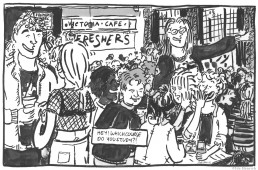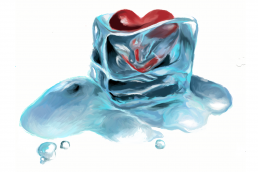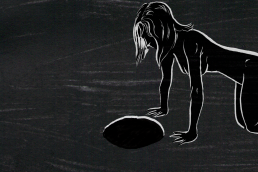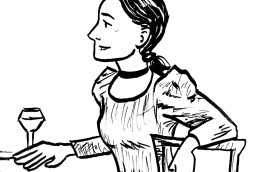by Charlotte Eyres
Image credit: Ida Henrich
Content Warning: eating disorders, bulimia
The summer just gone was a six-week period characterised only by a diagnosis of bulimia and depression and a whole lot of running away from responsibilities.
Going back into Year 13 was a brutal smack in the face. Before anyone even asked how my holidays were, questions about university applications and “the future” started rolling in, and even now their end seems far from near. Those around me seem to have it together; spending their weekends at open days and whacking out annotated drafts of their Personal Statements, listing yet another skill they can add to an already golden CV. In contrast, I spend my evenings cradling a box of cereal, forgetting that UCAS exists and creating a fantasy in which it might just get done without any effort at all.
Of course my rational brain knows this is not the case. However, my mental illnesses distract me from any desire for success. So how do I navigate applying for a future when I have a constant voice telling me I am unworthy of exactly that?
Thus far the process of applying to university has been a hindrance to my mental wellbeing. In school assemblies we are bombarded with rhetoric along the lines of “the decisions you make now will affect your entire future.” But the pressure and confusion of making such a choice has made me want to freeze time and retreat to safety, AKA my bed.
Struggling to find happiness in the hotbed of anxiety that constant examinations and “future talk” can create, I have found euphoria in bingeing on loaves of bread and bourbon biscuits. But as the antidepressants start to work their magic, I realise the clock is ticking and the 4-letter demon – UCAS – is staring me right in the face. The truth is, I am responsible. And higher education beckons.
It took the whole of last year to accept that – despite what teachers say – a lot of students choose a course that they like, with knowledge of the careers it leads to, but with no distinct aspiration.
I needed to rid myself of the notion that my whole life and, more importantly, who I become, depends on a decision made at the age of 17. I needed to start thinking short-term in order to cure the paralysis of fear that this might be true. What will I enjoy studying? How can I make myself happy in an environment that sounds like it can be quite lonely?
Philosophy is something I enjoy – and considering that, as a sufferer of depression, I spend the majority of my life asking profound questions about human existence – it may be more apt to do it from a lecture theatre than from the confines of my bedroom. Choice made!
I thought things couldn’t get any harder than finding a way to alleviate the fear of making decisions. Then along came the Personal Statement. I cannot count on the fingers of both hands the amount of tutorials I have sat through over the past year, listening to someone telling me to promote my talents and sell myself with all the Trump-like charisma I can conjure up.
The fact is, depression doesn’t allow me to do this. Currently there is a thick fog polluting my mind, making it impossible to recall anything that resembles an accomplishment. In one overwhelming session I remember tears rolling down my cheeks, and as the bullet points went on and on I found it harder and harder to believe I had ever succeeded enough to be accepted. Needless to say I have not got very far with the first draft, but the the UCAS deadline is rarely far from my mind.
It’s hard because, for many, revision and Personal Statements are the priority in their life right now. I honestly wish I could say the same. To be battling with understanding the politics of Charles I seems preferable to battling my relationship with food, my body and my outlook on life.
My mental illnesses make me feel childlike and reliant on others, leading me to consider carefully whether university is really the place for me just now. I always thought that I would go there right after school, and when I received my straight As in my GCSEs I felt set. But I was healthier then.
Now I am dealing with factors that I wasn’t expecting and I need to reevaluate whether the time is right.
In your UCAS application you can disclose your battles with mental illness and advise your chosen establishment on the ways that they can assist you. Despite this I believe that – for me at least – in order to feel capable of lasting the term, I need to be stronger in my ability to help myself. And I recognise that this is something I am far away from.
Charlotte Eyres
Charlotte Eyres is currently studying History, Ethics and Philosophy and Music at A level. Having kept quiet about her struggle with eating disorders and depression for a long time, she has recently discovered the healing power of writing and sharing her experience to educate others and make some people feel less alone.
Ida Henrich
Ida is a German Cartoonist, Illustrator and Designer based in Scotland. In her own work she explores themes such as sex-education, growing up, and women’s experiences. Her work is written for both men and women to read and aims to start a dialogue between partners, friends, parents and children. Her graphic novella, Minor Side Effects, is currently in its first edition and she hopes to bring out the next soon. Ida is a graduate of Communication Design at the Glasgow School of Art. A big influence on her work is Julie Doucet, with her brilliant autobiographical comics. Ida is currently working on a number of commissions including illustrations for short stories and businesses.









Thank you! This gave me some food for thought as a middle-aged woman and university lecturer.
Thank you – I find that for someone struggling to believe that academic success is possible for myself it is important to alleviate the pressure of everything resting on one moment/exam/grade and that there is life beyond. I find this makes it easier to relax and just do the best possible for me at this time in my life. I want to spread the word because many students I know feel the same pressures.